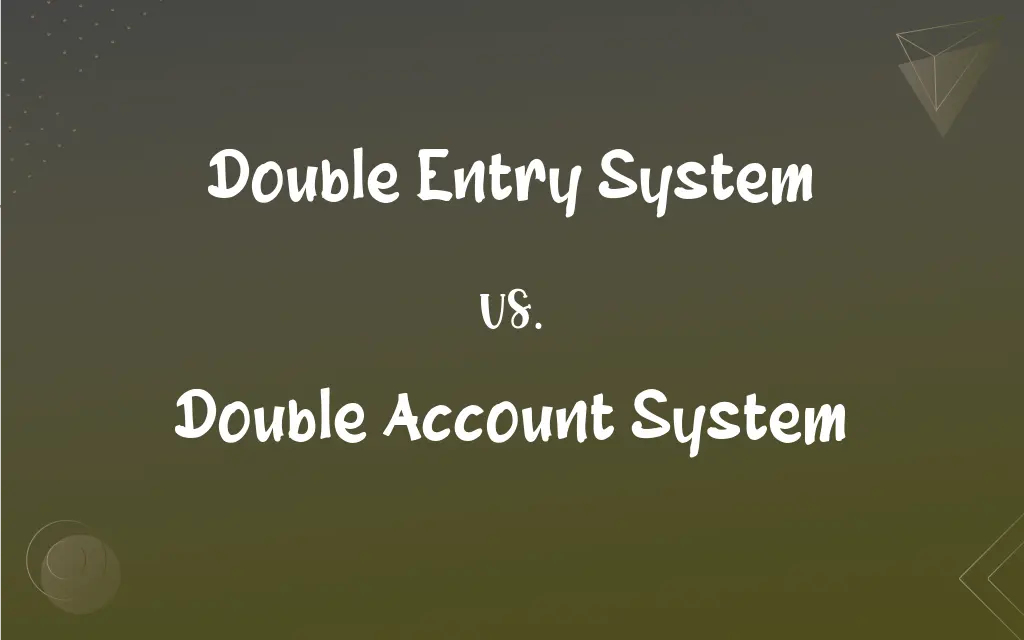Double Entry System vs. Double Account System: What's the Difference?
Edited by Harlon Moss || By Janet White || Published on December 23, 2023
The double entry system involves recording financial transactions twice, for balancing accounts, while the double account system is used mainly by utilities, recording assets and incomes separately.

Key Differences
The double entry system is based on the principle that every transaction affects two accounts, typically one debit and one credit. The double account system, however, is designed to segregate the financial information into two distinct sets of accounts, generally for capital and revenue.
The double entry system is universally used for maintaining general business accounting and ensuring accuracy by balancing debits and credits. The double account system is tailored for public utility companies or government accounting, where capital and operational expenditures need clear separation.
The double entry system has been a fundamental accounting method since the Renaissance, evolving with business practices. The double account system developed later, particularly for industries with significant infrastructure investment, to manage and report financial status more efficiently.
The double entry system can be complex but is widely applicable across all forms of business. The double account system, being more specialized, is less complex but limited in application to certain types of organizations.
Financial reporting under the double entry system involves balance sheets, income statements, etc. In contrast, the double account system produces two separate sets of accounts, one for capital related transactions and another for income and expenditure.
ADVERTISEMENT
Comparison Chart
Basic Principle
Every transaction is recorded twice
Segregates financial information into capital and revenue
Primary Users
All types of businesses
Public utilities, government entities
Historical Origin
Originated during the Renaissance
Developed for specific industry needs
Scope of Application
Universal for business accounting
Specialized for certain organizations
Reporting Format
Balance sheets, income statements
Separate sets of accounts for capital and revenue
ADVERTISEMENT
Double Entry System and Double Account System Definitions
Double Entry System
Universal Accounting Method.
The double entry system is a standard practice in business accounting worldwide.
Double Account System
Public Utility Accounting.
This system is particularly effective for entities like railways, where large capital investments are common.
Double Entry System
Error Detection.
Double entry accounting helps detect errors by ensuring totals of debits and credits match.
Double Account System
Two-Part Financial Reporting.
In this system, one account reflects infrastructure investments, while the other shows annual revenues and expenses.
Double Entry System
Balanced Accounting.
In the double entry system, purchasing equipment with cash is recorded as a debit to equipment and a credit to cash.
Double Account System
Capital and Revenue Segregation.
The double account system distinctly categorizes long-term assets and daily expenditures.
Double Entry System
Comprehensive Record-Keeping.
This system provides a complete view of transactions, affecting both assets and liabilities.
Double Account System
Sector-Specific Accounting.
Utility companies often use the double account system to separate capital expenditures from operational costs.
Double Entry System
Historical Foundation.
The double entry system has been the foundation of accounting since the 15th century.
Double Account System
Specialized Financial Structure.
The double account system caters to industries needing clear separation of capital and income accounts.
FAQs
Is the double entry system applicable to small businesses?
Yes, it's suitable for businesses of all sizes.
What is the double account system?
A system separating accounts into capital and revenue.
Why is the double account system favored by utilities?
It clearly separates long-term investments from operational expenses.
How does the double entry system ensure accuracy?
By balancing debits and credits for each transaction.
What types of entities use the double account system?
Mainly public utilities and government organizations.
What are the key reports in the double entry system?
Balance sheets, income statements, and cash flow statements.
Does the double entry system work with digital accounting?
Yes, it integrates well with modern accounting software.
What is the double entry system?
A method where each financial transaction is recorded in two accounts.
Is the double account system complex?
Less so than the double entry system, but more specialized.
Can the double entry system detect errors?
Yes, through the balancing of accounts.
What's the main challenge of the double account system?
Understanding and correctly categorizing capital and revenue transactions.
Is training required for the double entry system?
Basic accounting knowledge is necessary.
Who benefits most from the double account system?
Entities with distinct capital and operational financial streams.
Can the double entry system be used for personal finance?
Yes, though it may be more complex than needed.
Can nonprofits use the double entry system?
Absolutely, it's versatile for various organization types.
Are there any industries where the double entry system isn't useful?
It's universally applicable across all industries.
Are there limitations to the double account system?
Its applicability is limited to specific sectors.
How does the double account system aid in regulatory compliance?
By providing clear, segregated financial reporting.
Does the double account system align with standard accounting principles?
Yes, but with its unique approach to categorization.
Does the double account system require specific software?
Yes, software that can handle its unique structure.
About Author
Written by
Janet WhiteJanet White has been an esteemed writer and blogger for Difference Wiki. Holding a Master's degree in Science and Medical Journalism from the prestigious Boston University, she has consistently demonstrated her expertise and passion for her field. When she's not immersed in her work, Janet relishes her time exercising, delving into a good book, and cherishing moments with friends and family.
Edited by
Harlon MossHarlon is a seasoned quality moderator and accomplished content writer for Difference Wiki. An alumnus of the prestigious University of California, he earned his degree in Computer Science. Leveraging his academic background, Harlon brings a meticulous and informed perspective to his work, ensuring content accuracy and excellence.































































